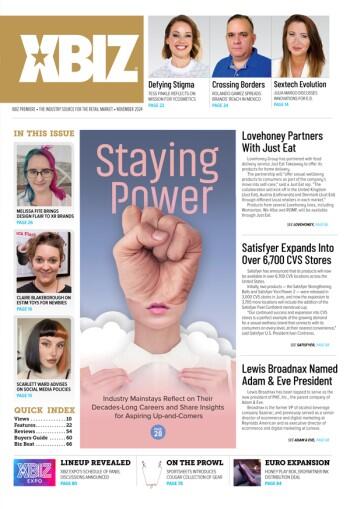While a stiletto-clad Carrie Bradshaw glamorized the life of the sexologist on cable television, career optimization for a sexuality educator in the real world takes significantly more than designer shoes. For Megan Andelloux, Charlie Glickman, Emily Morse and Jamye Waxman — it took consummating the appropriate relationships with sex toy manufacturers, circumventing barriers erected by a generally sex-squeamish society and procuring advanced-level education.
“It’s like sex,” says Jamye Waxman on becoming a sexuality educator. “There are so many ways to get there.” Waxman, as well as Emily Morse, entered through media. Waxman went from being a radio producer to writing for Playgirl to establishing a relationship with couples-oriented pornography producer Candida Royalle. Morse started out making documentary films before she launched her podcast “Sex with Emily” which documents intimate lives in an educational and non-judgmental space. Alternatively, Megan Andelloux, or OhMegan to her fans, and Charlie Glickman entered the field through more didactic channels. She started as an educator at Planned Parenthood; he started as a safer sex and queer outreach educator at Brown University then became an educator and sales associate for Good Vibrations.
Monetize. I talk about [sex] toys all the time on my show … when I do have sponsors, I like to feel good about the product and figure out how we can help each other. - Emily Morse
“There are different paths due to different facets of sex,” Glickman advocates. “The thing with sex ed is you can’t just look at one piece of it if you are going to do it right. There are different ways to look at sex.”
From books to workshops, sexuality educators employ a wide range of mediums. Megan Andelloux founded the Study Sex College Tour after being told that sexuality shouldn’t be learned at higher education institutions. “I had a church group protest me,” says Andelloux. “But I wanted to show that we can talk about sexuality on campus in an intelligent manner …. [I] started these speaking tours out of a need to allow college students to feel like they could explore sexual issues in a fun yet respectful and medically accurate way... I once met a woman who thought she would become crippled if she had premarital sex. With Study Sex, I want to also prevent sexual shame.”
In Emily Morse’s “Sex with Emily” podcast, Morse gets to know her audience intimately. The mediadubbed “sexpert” also lets fans get to know her via another platform: her reality show “Miss Advised” on Bravo. “I really want to reach everybody,” says Morse. “The amazing thing about podcasting is that people all over the world can access it. Sex is so pervasive in our society and there is so much misinformation. I want to really just get the message out there in any way I can in addition to “Sex with Emily.” That’s why I said yes to a reality show. Talk shows, apps, my podcast… anything I can do to help people learn about sex.”
But how can strangers help us learn about our sex-lives? Andelloux is a certified sexologist, Morse holds two bachelors degrees and is working towards a Ph.D, Waxman holds a Masters in Sex Education with a second masters on the way and Glickman holds an Adult Sexuality Education doctorate. While there clearly isn’t a shortage of accreditation among the educators, shouldn’t something as intimate as sexuality transcend the pedantic realm?
“I’ve always really liked helping people discover new things,” says Glickman. “In my experience, it is important to facilitate discovering sex and how to enjoy sex in a positive way … there are barriers preventing people from having the kind of sex that is great during and also sex that makes you feel like you did the right thing even afterwards … everyone is different but we all have to be able to move past our challenges to achieve discovery.”
As Waxman and Glickman divulge, being a sexuality educator is neither solely about sex nor education. “We had experts in the field come on our show when I was producing for radio,” Waxman says. “I was lucky to have connections when I started.”
According to Glickman, “If you want to do this as more than a hobby, learn to run a business. Your great products and amazing info won’t mean anything if you can’t make it a sustainable business.” “Monetize,” Morse implores. “I talk about [sex] toys all the time on my show… when I do have sponsors, I like to feel good about the product and figure out how we can help each other. Chevrolet isn’t advertising your show if it’s called ‘Sex with Emily’ and not all the toy companies are selling at Walgreens like Trojan. I want … mutually beneficial relationships.”
Morse brings up an apt point and imperative constituent in the business of sex educators. Andelloux, Glickman, Morse and Waxman are all in some way shape or form in partnerships with sex product manufacturers and companies.
“I establish partnerships by attending shows, conferences and meetings,” says Waxman, who is the sex educator for Lovers, A Touch of Romance and Condom Revolution. “I spend time with the companies; show them I am genuinely interested. I love companies like Lovers, who get that the education component is a key part to selling. Also, I find local companies have big ideas. When you go local, you grow local.”
Andelloux emphasizes a personal approach to establishing business partnerships and the importance of philosophical alignment. “I want to get to know them outside of a show booth, over coffee or supper … see the person behind the product … if we align. For example, I love speaking out about science … manufacturers don’t always have time or access to that but educators are filled with fun facts that can help people learn about products in new ways.”
Finally, there is a fortified consensus over three deductions of the sexual education business: it is exciting, it is indispensable and it won’t make you rich. “It’s … tough to make a living,” says Glickman. “Workshops, for instance, don’t pay bills. Typically, educators do these on the sidelines or they have coaching services … work for a company … have a new product or book out.” Glickman recently went on tour for his book The Ultimate Guide to Prostate Pleasure sponsored by Aneros. “There is so much free information out there too … it isn’t always good and it is up to [educators] to curate the material.”
“There are different ways to look at success,” says Andelloux. “If you measure using income, then sexual education isn’t necessarily for you. It isn’t even necessarily for you if you love sex. It’s about changing the sexual cultural dialogue.”
This cultural dialogue may be the overarching theme in the sexual education field. In fact, Jamye Waxman has a word for this dialogue as it exists between sexual educators. “Complimentition. Competition is so negative,” she says. “The sex industry is smaller than a lot of other industries. We all join the conversation in different ways. Basically, even on a business level, we are all in this together and it is exciting.”
Few would argue that learning and teaching about sex and pleasure isn’t exciting. Nevertheless, if the field is as small and as marginally profitable as they say, sexology adduces a robust irony: a market needed by all, yet paid for by few. After all, as Glickman posits, “no one is born knowing anything about sex.” But we certainly all have it.








